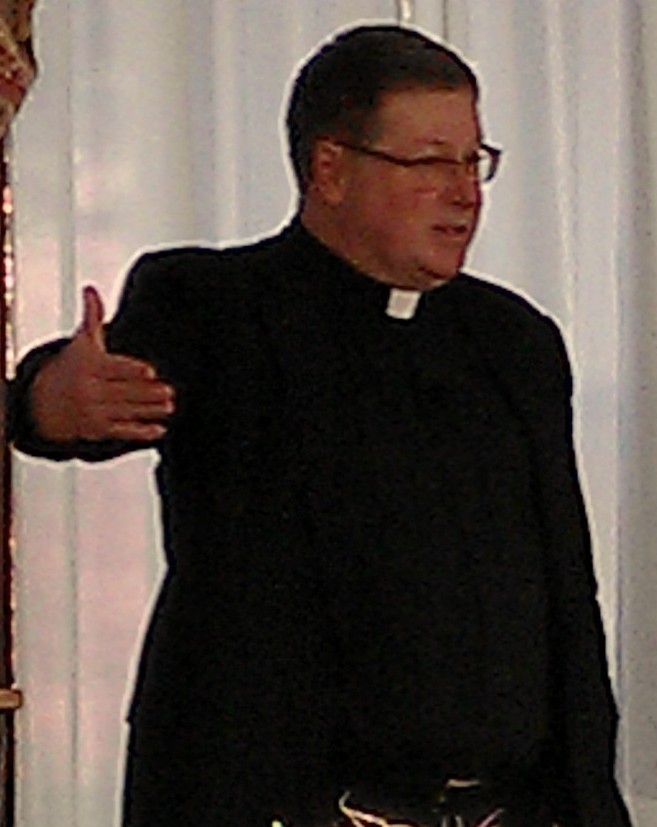 Fr. Jan Michael Joncas at PCOn Thursday, April 18, 2013 Providence College hosted Father Jan Michael Joncas, Ph.D. as the presenter for the annual St. Catherine of Sienna Lecture. A celebrated professor and lecturer, author and liturgical composer, Father Joncas holds the Artist in Residence & Fellow of the Center for Catholic Studies at St. Thomas University in Minneapolis, Minnesota as well as the post of Associate Professor of Catholic Studies and Theology. Add to his list of credentials "a really nice guy." He enjoys people, engages in conversation with deep intention and makes you feel as though you're in the only person in the world when you speak with him. He is a gift to the Church.
Fr. Jan Michael Joncas at PCOn Thursday, April 18, 2013 Providence College hosted Father Jan Michael Joncas, Ph.D. as the presenter for the annual St. Catherine of Sienna Lecture. A celebrated professor and lecturer, author and liturgical composer, Father Joncas holds the Artist in Residence & Fellow of the Center for Catholic Studies at St. Thomas University in Minneapolis, Minnesota as well as the post of Associate Professor of Catholic Studies and Theology. Add to his list of credentials "a really nice guy." He enjoys people, engages in conversation with deep intention and makes you feel as though you're in the only person in the world when you speak with him. He is a gift to the Church.
Father Joncas' presentation entitled "I will not let you go, unless you bless me: The Spiritual Journey in Catholic Imagination," incorporated content and examples from various arts and literature as he explored the three stages of childhood, adolecence and maturity to examine the human quest for God.
Childhood
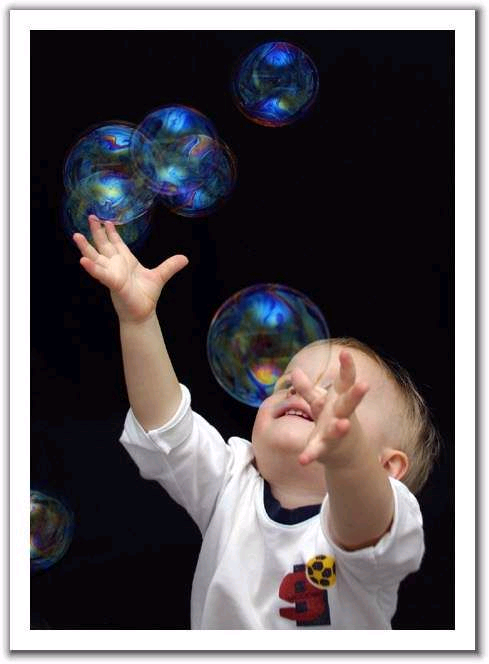 Beginning with a piece written by bestselling and Pulitzer Prize-winning author Michael Chabon, Joncas rehearsed the elements of the human spirit beginning with childhood. We see the world with wonder, marveling at simple, tangible things that fill us with awe and delight. Father Joncas read Pied Beauty by Gerard Manley Hopkins. The sonnet invites the sacramental sense of the sacred that ends in praise of a God who creates marvelous diversity and delights in the myriad varieties of talents and abilities of the human family given as blessing and gift by a God who loves us beyond anything we can ever imagine.
Beginning with a piece written by bestselling and Pulitzer Prize-winning author Michael Chabon, Joncas rehearsed the elements of the human spirit beginning with childhood. We see the world with wonder, marveling at simple, tangible things that fill us with awe and delight. Father Joncas read Pied Beauty by Gerard Manley Hopkins. The sonnet invites the sacramental sense of the sacred that ends in praise of a God who creates marvelous diversity and delights in the myriad varieties of talents and abilities of the human family given as blessing and gift by a God who loves us beyond anything we can ever imagine.
Using his own setting of Psalm 118 This is the Day, Father Joncas propelled us into exhilarating Easter joy through his brilliant and straightforward setting that includes a succession of bold Alleluias that underpins and sustain the chorus: This is the day the Lord has made; let us rejoice and be glad." Alleluia, translated "Praise God" cohesively connected us to Hopkins' sonnet that simply ends "Praise Him."
Adolescence
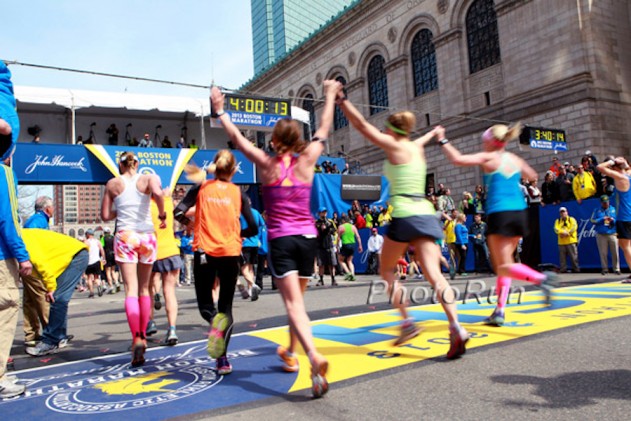 As I listened to this portion of the presentation, I recalled the childlike joy, the awe, the wonder and delight of the diversity of people that created a community to cheer runners to the finish line at the Boston Marathon last Monday. The beauty of the day and the joy of the community looked like Easter morning, the early childhood of Christianity. And then, like children gradually becoming involuntarily aware of human heartbreak, violence, cruelty and despair, we were thrust into adolescence, where struggle becomes reality, glory is diminished and swallowed up by fear and brokenness and the darkness of sin becomes a concrete entity. Without faith, this malaise can be irreparable and last an entire lifetime.
As I listened to this portion of the presentation, I recalled the childlike joy, the awe, the wonder and delight of the diversity of people that created a community to cheer runners to the finish line at the Boston Marathon last Monday. The beauty of the day and the joy of the community looked like Easter morning, the early childhood of Christianity. And then, like children gradually becoming involuntarily aware of human heartbreak, violence, cruelty and despair, we were thrust into adolescence, where struggle becomes reality, glory is diminished and swallowed up by fear and brokenness and the darkness of sin becomes a concrete entity. Without faith, this malaise can be irreparable and last an entire lifetime.
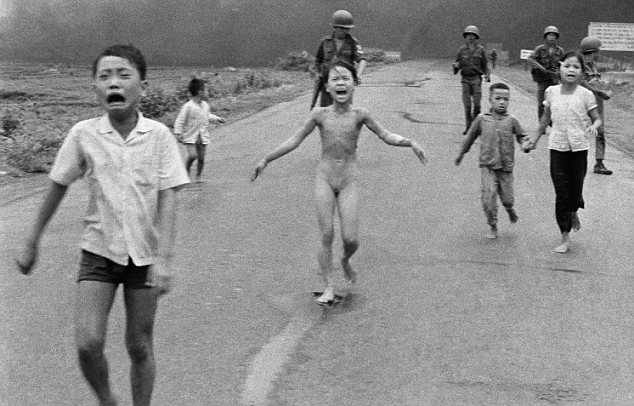 Photo by Associated Press photographer Huynh Cong UtCalling upon the Catholic imagination, Fr. Joncas used Gerard Manley Hopkins' poem Spring and Fall, which observes a young girl on the cusp between childhood and adolescence. The poet declares that "ultimately, all human sorrow derives from a single source - our consciousness of our contingency and finitude, so that all our mourning is grounded in mourning." (Joncas, 4.18.13)
Photo by Associated Press photographer Huynh Cong UtCalling upon the Catholic imagination, Fr. Joncas used Gerard Manley Hopkins' poem Spring and Fall, which observes a young girl on the cusp between childhood and adolescence. The poet declares that "ultimately, all human sorrow derives from a single source - our consciousness of our contingency and finitude, so that all our mourning is grounded in mourning." (Joncas, 4.18.13)
Chiseled into our memories are the sights from Monday's Boston Marathon events that reminded me that other members of the human family have suffered atrocities and thrust innocent children into the grueling human work of adolescence.
In his presentation, Father Joncas described the intuition of the wound is at the heart of the world and the world's own woundedness comes from itself -- a falling from grace in its origin from the beginning of time and still active and present among us. How do we move from adolescent behavior into a mature faith and awaken to the reality that we contribute to the wounded world? Let those among us without sin cast the first stone; there are many ways to inflict pain and suffering without thrusting explosives into the midst of a collected crowd of people. Therein lies the challenge: to surrender to redemptive grace as opposed to idolizing our own ego. That's called growing up.
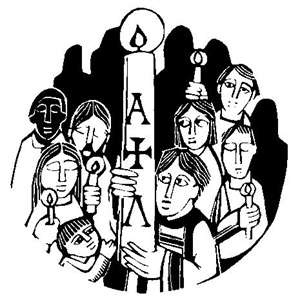 How many of us have read in the ream of social media that some people to refuse pray or forgive the perpetrators of Monday's terrible act of violence? What are the wounds within the adolescence of these two young men that led them to such heinous acts? Can we take some responsibility that we may have contributed to those wounds? Where is mercy within us? Can we find it in our hearts to forgive seventy times seven, as Christ instructs us? (Matthew 18:22) Or will we stay stuck in the muck of bitterness, anger, despair and brokenness, which destroys life as surely as an explosion?
How many of us have read in the ream of social media that some people to refuse pray or forgive the perpetrators of Monday's terrible act of violence? What are the wounds within the adolescence of these two young men that led them to such heinous acts? Can we take some responsibility that we may have contributed to those wounds? Where is mercy within us? Can we find it in our hearts to forgive seventy times seven, as Christ instructs us? (Matthew 18:22) Or will we stay stuck in the muck of bitterness, anger, despair and brokenness, which destroys life as surely as an explosion?
Worse, will we allow the darkness of evil to perpetrate our souls and ask for an eye for an eye? Turn to history for the answer: darkness begets darkness. We have been shown the way of life through Christ, the Light of the world. Light every Paschal candle and walk into the light of that mystery every day. That light, that mystery, that paschal hope is the only way out of the darkness. Easy? No. But if we call ourselves Christian, this is what is required of us, what separates us from those who will not love, not forgive and refuse to move from an adolescent faith into mature faith. Perhaps it's time to ask: what do we believe?
Maturity
Fr. Joncas moved us into the final stage of Catholic imagination with That Nature is a Heraclitean Fire and of the Comfort of the Resurrection, whose line "Enough!" resonated loudly and clearly this week. Enough of this time of false gods, of misplaced passions and entitlement, of hard-heartedness and cruelty. Enough! Are we not people of the Cross and Resurrection? How will grace move us to recover our wholeness and share in Christ work to shape the world into a place of living saints, not hallowed in heaven but living here and now on earth. If we believe that the Resurrection makes life possible, all life, than we have the last word over the darkness of wounds, of division, of heartache and bitterness, of wars and weapons, of joy over sorrow. We have it in our power to move into agapic love and a mature faith by crying in one voice "Enough!" But it will take more than a village. Like the agapic love of the Trinity, we must encircle the globe with the light of Christ through the use of our imagination, our creativity, our wholehearted committment to be one peoples for all peoples. This is the only solution to the current culture of fear, retaliation and injustice. The end of this sickness begins one person at a time, one deed at a time.
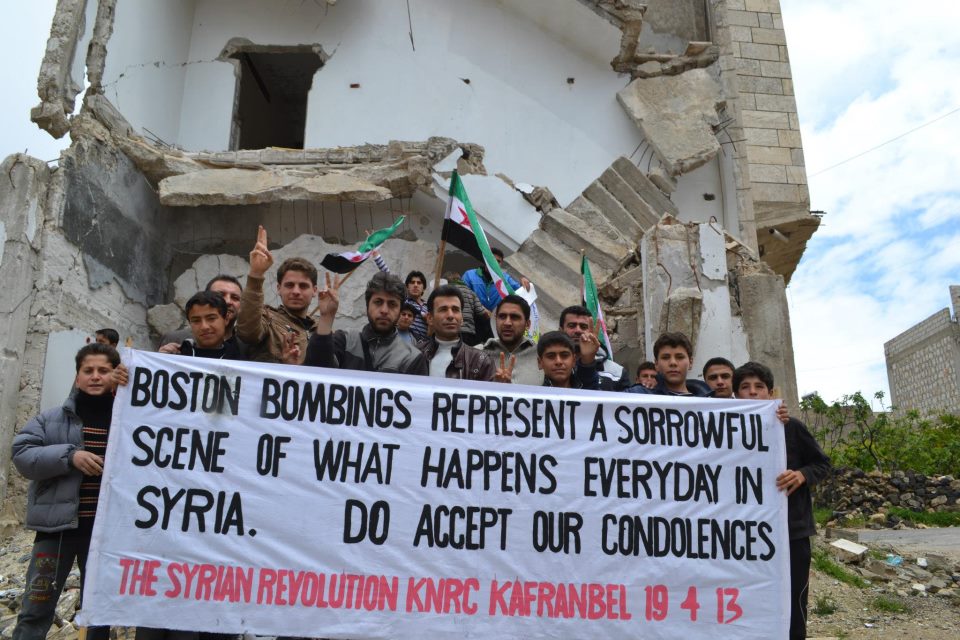
Solidarity
As Father Joncas' presentation came to a close, my thoughts moved again to friends and neighbors that I have not yet met who live around the world and fall victim to terrible crimes against humanity everyday. Later, this picture came across my Facebook page. This is solidarity at its finest. Can the community that calls itself Christian bring itself to do likewise and forgive those who persecute us?
Gratitude and prayer
Following Father Joncas' lead, I suggest sitting with his setting of Psalm 139, You Have Searched Me, which he used in his presentation and one of my long standing favorites. Many thanks to Father Joncas for a magnificent presentation and to Providence College for its sponsorship.
We continue to pray for the victims of the Boston Marathon, the deceased and their families and for a nineteen year old boy who walked into the darkness instead of the light. May we be the light of Christ for all in the days and years ahead.
May the Easter light that shines from the East rise in our hearts to bring light to the darkness, warmth and hope to a despairing world and keep Christ alive through our words and deeds.
Amen.